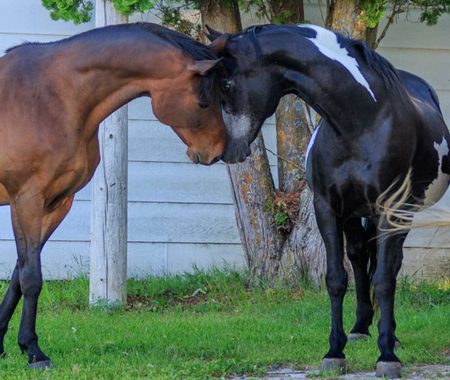When you walk into the office at EVR, you’ll see a small wooden sign in the window that reads: “The best therapist has fur and four legs.” This sign is one of the biggest clues that a counseling session at EVR has a few extra tools in the psychotherapy toolbox. Other clues might include the two cats and occasional dog sleeping/playing in the office.

Prince and Montana
The atmosphere is laid back, the decor is western rustic and the view from the office window overlooks a woodsy horse pasture (horses included). But don’t be fooled, the psychotherapy sessions and group team/skill building activities at EVR are designed to help people overcome, problem solve, heal, and build resilience over some of life’s challenging obstacles, traumas, and tragedies.
Horse Sense
Many of the sessions are conducted out in the pasture with the horses. So, why horses? A short answer is that horses can mirror/reflect what people are feeling and through the use of metaphors, the client can work on their mental health “stuff.” Horses are social herd animals with different personalities, emotions, and temperaments. They can get angry, sad, depressed, happy, curious, playful and scared, too. During sessions people can see these equine actions/reactions and interactions as metaphors in their own lives.
Natural Horsemanship
Horse training has evolved over the years. What was once what many might consider harsh techniques has been replaced with more subtle, gentle, and nonverbal relationship building with horses. Experiential Learning is an important part of the therapy process. Training and working with a horse includes building trust and communication. Horses help people learn to be aware of their body language and nonverbal communication.
“Tell me and I forget. Teach me and I remember. Involve me and I learn.”
-Benjamin Franklin
The Center for Research on Learning and Teaching at the University of Michigan defines Experiential Learning as “an engaged learning process whereby students ‘learn by doing’ and by reflecting on the experience.” (You can find out more at the University of Michigan, Center for Research on Learning and Teaching www.crlt.umich.edu/tstrategies/tsel) Working with horses during a therapy session is only part the process. But getting out of the office, unplugging from technology, walking, and being out in nature while working on stuff also seems to have a positive effect for people. A 2015 article and study from Stanford University found that spending time in nature seemed to help a person’s mental health. You can read more about the article and study here.
At EVR we have heard clients talk about the ways a session with the horses helps them. We have found that nature, horses, and experiential learning combined with psychotherapy gives people more tools to work with on their journey.

